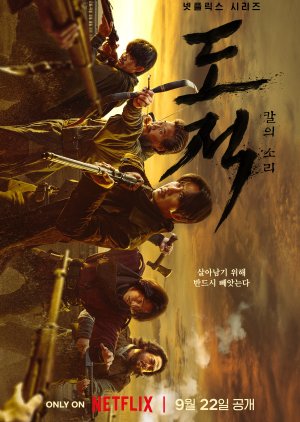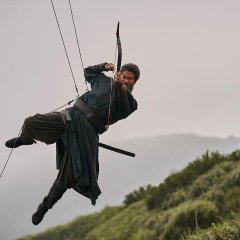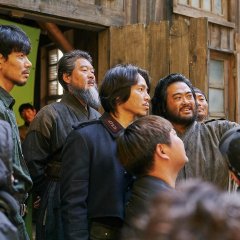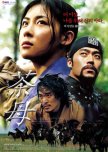 Yoo Jae Myung to meet Kim Soo Hyun in a new Disney+ K-drama
Yoo Jae Myung to meet Kim Soo Hyun in a new Disney+ K-drama An action melodrama in which the people who have been deprived of their livelihoods blow a refreshing shot for their family and colleagues, set in the 1920s during the Japanese colonial period. (Source: Naver) Edit Translation
- English
- Українська
- Čeština
- Italiano
- Native Title: 도적: 칼의 소리
- Also Known As: Bandit: The Sound of the Sword , Thief: The Sound of the Sword , Dojeog: Kalui Soli
- Screenwriter: Han Jung Hoon
- Director: Park Hyun Suk, Hwang Joon Hyuk
- Genres: Action, Thriller, Historical, Drama
Where to Watch Song of the Bandits
Subscription
Cast & Credits
- Kim Nam Gil Main Role
- Seo Hyun Main Role
- Yoo Jae Myung Main Role
- Lee Hyun Wook Main Role
- Lee Ho Jung Main Role
- Lee Jae KyoonCho Raeng ISupport Role
Reviews

This review may contain spoilers
Captivating. Cinematic. Action-packed, yet offering impressive quiet & heartwarming tuning, too
Gando is the land of the desperate, the realm of the desperados of Joseon. In the 1920s, it was also a territory in which political responsibilities and affiliations were vaguely regulated. Some things may remind you of the Wild West. Yet this Wild North in the Far East is quite different...“Song of the Bandits” is a brilliant Netflix historical drama about a certain chapter of recent Korean history. Moving. Captivating. Cinematic. It exudes the vibes of an Eastern. The KDrama surely is gory action and turbulence at most times, but offers impressive quiet and heartwarming tuning, too. Action-packed it is, yet humor and romance modestly fit in as well. "Song of the Bandits" is astonishingly well balanced in this respect and for a Netflix production, despite its polished and action-driven choreography for a broad international audience, sticks surprisingly consistently to a more subtle Korean series style. Nicely done at all scales. We get a feeling of the Manchurian landscape with Gando impressions filmed at original locations. This all framed within a consistently beautiful soundtrack. It all lasts for 9 episodes (only! Yet?). In spite the overall ambitious commercial production context, aiming at an international “Squid Game”-like success, “Song of the Bandits” was able to impress me with a historically and emotionally complex story with great mimes - Kim Nam-gil, Yoo Jae-myung, Lee Ho-jung and Lee Hyun-wook in their element. But so is everyone else. This is where KDrama and Netflix perfectly come together...
'Bandit: The Song of the Sword' is the original title. In fact, people don't swing swords so much as they use firearms. The KDrama is epically processed, offers great emotions, while telling about people and the range of motives for which people are prepared to fight. It's about resistance, obedience, venality, oppression, social affiliation, the fight for freedom. There are even some spiritual thoughts attached to it along the way. It is about the Joseon people, some personal fate, as well as 'the' history of Chosen - an emotionally quite ´Korean´ excerpt of modern history. Its thematic historic setting (even if the rest of the world might not care so much about it, as it is not requisite for an entertaining series pleasure) contains a lot of explosive material by Korean standards. Therefore firearms are in several respects quite consistent in this context…
As far as I am concerned, I do care about the historical context. On the contrary, I find it quite intriguing - besides the dramaturgically action-packed and emotionally charged story with its complex, interwoven relationship dynamics and conflicts. As I said, you don't really need to know the background to be enthusiastic about "Song of the Bandits". But if anyone might be interested, see the historical side note about 'Gando', the border region on the north bank of the Tumen river, which today also marks the border between northeast China and North Korea.
PS:
Yep, the ending of the story...
If you like, you can dream of more. It could be possible. Yet, it would still go on and on.
Who knows if there may be a sequel...
Nevertheless, from my perspective the ending is quite fitting. (Whether I like it or not.) In terms of the historical events, things are as they are. We want fiction to write a different ending, but it still wouldn´t be any better, rosier or brighter for hardly any of the various protagonists... Therefore, from a Korean perspective the ending of this story remains true to the spirit of the actual Chosen-history: For Joseon people it is and remains unsatisfactory, unfair and painful. ´We´, as an international audience (temporarily and figuratively with our personal discontent), can/shall/must/may thus empathically share this collective emotion, too.
-----------------------------------------------------------------------
SIDE NOTE: --- Gando, also called Jiandao, and today Yanbian ---
Gando historically stands for a specific borderland. To this day it is a region with a high proportion of people of Korean origin.
Gando is a small, perhaps inconspicuous scar in Korean history – yet a scar that is still weeping, sort of...
Gando (and Manchuria in general) is also associated with the regrouping of the Rightous Army and thus with the patriotic pride of resistance against colonial oppression. With "Song of the Bandits", the issue of Gando has now obtained an impressive, international onstage introduction...
This 'Gando', Jiandao or Yanbian was the last nail of hope for an increasing number of desperate people from Joseon (and still is for some North Koreans today) who had nothing to lose and would rather settle for an arduous life and try their luck in this section of Manchuria - a back then relatively undeveloped marshland on the north bank of the Tumen river.
First - in the course of, and especially at the end of, the 19th century - famine and poverty drove poor Joseon people to the far north. Then, at the beginning of the 20th century, it was the hope to escape from Chosen, which was finally officially annexed by the Japanese. The Righteous Army militia was also formed anew in Manchuria at that time.
After the annexation of Joseon, with respect to a relatively large population of Joseon people, the Japanese as part of their aggressive expansion efforts also demanded this coastal territory north of the Tumen from the Chinese. Infiltration was followed by an invasion in 1907, but already by 1909 there was withdrawal again. Officially, as a result of the diplomatic negotiations, the area eventually became Chinese again and Japan received railroad concessions, while the Joseon people remained under Japanese rule due to their Korean descent.
"Song of the Bandits" sets its story in this political quagmire: the decade before the belligerent 1930s, before the Empire of Japan invaded Manchuria, established the puppet state 'Mandschukuo' and used it for its own political and economic purposes. The prerequisite for this was a massive expansion of railway lines - especially the North Chosen Line along the border region between Chosen and Manchuria, that had been built during those previous years, while the Bandits sang their song...
Outlook:
After the end of the Second World War, many Koreans went back to their homeland, but by no means all of them. Around 810,000 people of Korean origin apparently still live in the Yanbian Autonomous District of China's Jilin Province to this day. In 1952, the proportion of the population with a Korean migrant background was around 60 percent. Then, Korean language was official. However, especially since the late 1990s, the Chinese government had specifically tried to force linguistic and cultural assimilation in order to counteract political currents in South Korea and discussions about a possible legitimate Korean claim to 'Gando'. These currents believe that - regarding those dubious events of the early 20th century and Gando Convention between Japan and China becoming obsolete with the ending of the World War II – this Gando territory actually is political void and should now belong to (in this case North?) Korea. Thus, Gando's territorial status for some still is not satisfactorily resolved…
Incidentally, desperate North Korean refugees are continuously trying to get to China via the Tumen river, which is icy during the long, cold winter months. Thus, Gando territory invariably remains a last nail of hope for desperate Koreans even up until today...
Was this review helpful to you?

This review may contain spoilers
"Times make the wrong choices, but history does not."
Song of the Bandits was a 1920's historical set on the border of China with a decidedly modern feel. It combined the Joseon independence movement with elements from a Sergio Leone spaghetti Western. Gun slingers and bar fights set to a raucous score led by the talented Kim Nam Gil made for an entertaining drama.Lee Yoon is the freed slave of Lee Kwang Il. Together they joined the Japanese army with Kwang rising in the ranks. Upon receiving a letter with the name and address of a man from Yoon's past he leaves and heads to the border settlements. He is given the gift if not of forgiveness, at least purpose to his life. He puts together a band of talented but misfit bandits. "They wouldn't come here if their brains worked right." An assassin is sent after him and as the days go by and the bandits' missions become more dangerous, the past, a love interest, the assassin, the Japanese, and big badder bandits are all set forth on a collision course that will leave a sea of spurting blood in their wake.
The cinematography and scenery were beautiful. Some of the sets might be familiar to Mr. Sunshine fans and there were also ones that came right out of a wild west town. I enjoyed the variety of music in this drama. The music was engaging, some songs rousing and others more quietly emotional. Spanish guitar was used as well as the whistling from old spaghetti westerns. The fight scenes were creative, blood spurting, and fast-no blurred knives. Much of the action was highly stylized. I particularly liked that the female assassin stayed competent and strong throughout the film with her own code of ethics.
The acting ran the gamut. Kim Nam Gil perfectly fit the conflicted bandit leader. Yoo Jae Myung made for a badass grandpa Legolas with his own checkered past. Lee Ho Jung held her own in scenes with KNG and she made Eon a compelling character. The bandits were archetypes-an axe wielding nimble ex-clown with sticky fingers, a drug addicted sharpshooter, and a mountain of a man. Each actor made their role their own. The relationship between Yoon and his ex-master Kwang felt ill-developed as if the writers couldn't decide if they truly wanted to cut the ties and make them bitter enemies despite Kwang's reprehensible actions. Seo Hyun was the biggest let down. She was unable to bring any depth or interest to her role as Hee Shin, leaving the character as bland as sand. There was no chemistry with Kim Nam Gil which meant when scenes focused on them or the fledgling romance the story ground to a stop.
I enjoyed this drama that for the most part was fast paced and coherent even if it became repetitive and ran out of steam near the end. The ending was abrupt leaving some questions unanswered despite the historical boundaries. That's not to say the drama wasn't entertaining, it was. The chemistry and camaraderie between the bandits and Yoon and Eon were fun and captivating. The scenery was stunning and the music was emotional and enthusiastic. Song of the Bandits brought to life the struggles and fragility of life while being occupied not only in Joseon but in communities on the border. Even though it would take another 25 years to drive the oppressors out, the drama showed how people long to be free and are willing to risk their lives in the face of insurmountable odds to protect their homeland, family, and friends. Whether you are a Kim Nam Gil fan or of historicals in general, this is one to give a try.
9/22/23
Was this review helpful to you?
Recent Discussions
| Title | Replies | Views | Latest Post | |
|---|---|---|---|---|
| Eon Nyeon Yi nd Lee Yoon are the game honestly ❤️❤️?⚔️ by ArbazAkhtar__HOD | 12 | 0 | ArbazAkhtar__HOD Sep 30, 2023 | |















 1
1





































